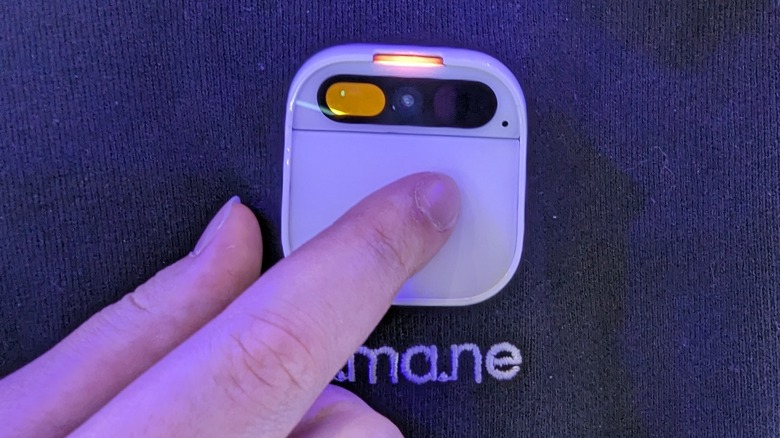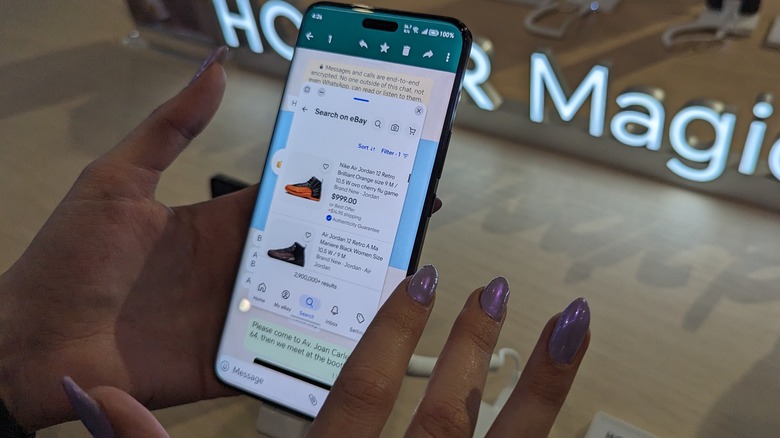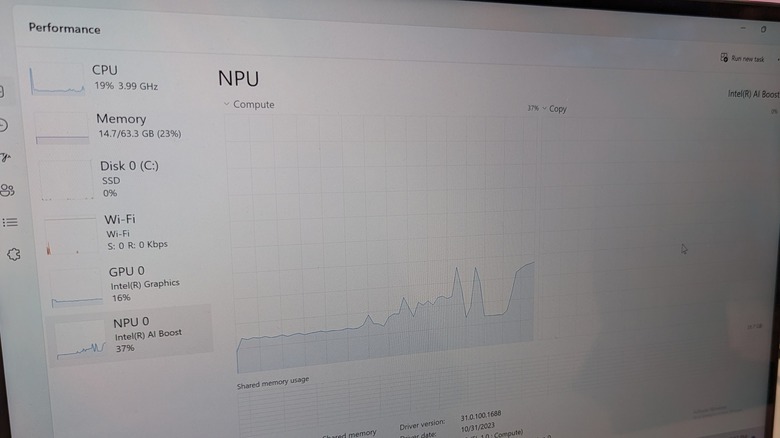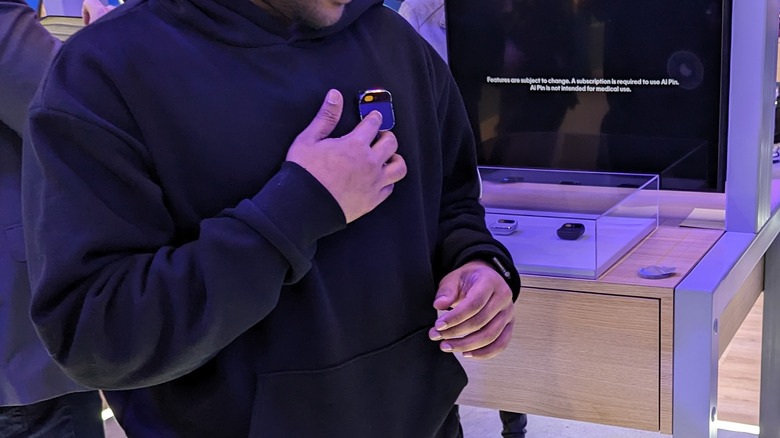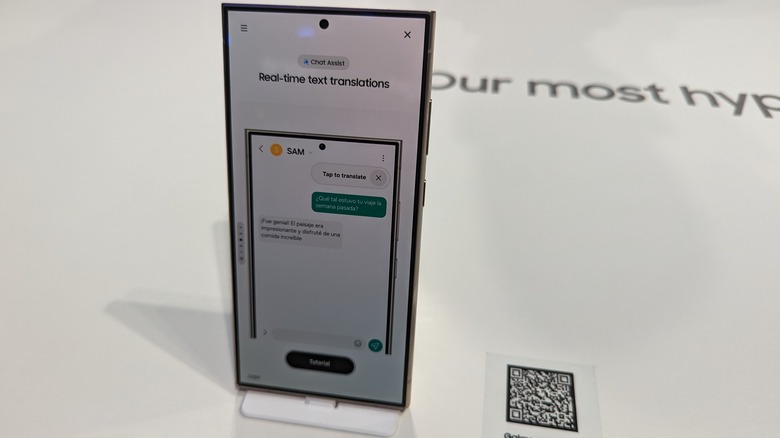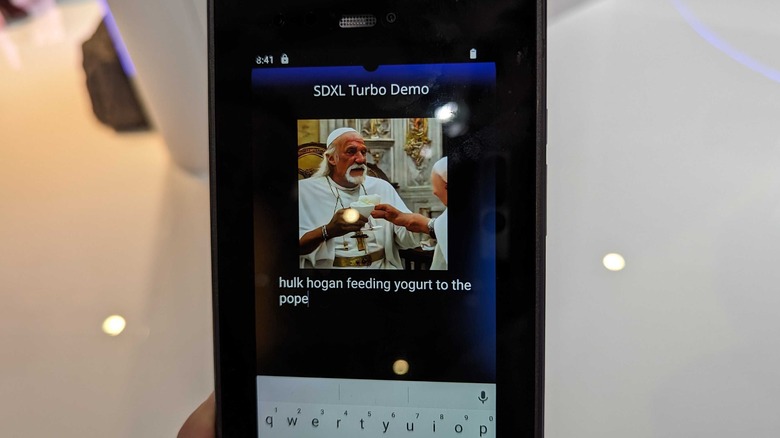The Best Implementations Of AI We Saw At MWC 2024
At MWC 2024, and CES before it, AI was obviously a hot topic. Instead of new devices themselves being the center of attention, crowds instead flocked towards what are essentially programs that work on those devices. If we're looking for a theme within a theme, then it was certainly on-device AI.
Instead of these vast programs you'll need a PC and an internet connection to access, all of that power is likely to be contained in your pocket. It may also make the device itself more powerful, and far easier to use. This is backed up by dedicated AI chips, which we saw in a consumer laptop for the first time during our visit to Barcelona. There's also an entirely new kind of AI-reliant device that could wind up being something you use every day.
While programs like AI image generators may be a bit of a novelty for some people, there were advancements on display at MWC 2024 that should put that entertainment value through the roof. Aside from the amusement aspect, there are parts of said image generators that should give hope to those using them for serious purposes.
Then there's the stuff that will make every day life easier: Think real-time conversation translation, the ability to work out what an object is from a simple photo, and the exact app you need popping up automatically right when you need it. Here are five of the best uses of AI we witnessed at MWC 2024.
Honor's Magic Portal gives a glimpse into the future
While AI has some pretty obvious, in-your-face applications like Bing Chat, MidJourney, and OpenAI's Sora — those obvious programs may not be what impacts our daily lives the most. Instead, it will likely be small, quality-of-life features like Honor's Magic Portal that make everything a bit easier for everyone. Even if it isn't immediately noticeable.
Magic Portal made its debut at MWC 2024, and works on the two devices that the Chinese company unveiled there — the Honor Magic 6 Pro and MagicBook Pro 16 laptop. It currently works with around 100 of "the world's most popular apps," and this number is likely to grow alongside the number of devices that feature the AI tool.
So what does it do? It uses contextual clues to streamline how you use your phone. If you highlight the name of a product, apps like eBay show up so you can then buy one. Addresses will pull up the maps app, and so on. More than one app tends to show up too, you can expect several ranked by how closely the AI believes it meets your current needs based on context.
Dell's AI chip helps bridge a gap
On-device AI is a common theme these days as people look to reduce costs and increase reliability. Yes, you don't have to constantly feed a locally-based AI tokens, and it works just fine without internet, but there are some trade-offs. It's going to be noticeably less potent than the likes of ChatGPT, Bard, and whatever silly name Musk attached to its AI efforts on X (formerly Twitter).
Given the resources large companies have at their disposal, this gulf in quality is unlikely to disappear any time soon. However, developments are being made that may help bridge the gap. Dell has partnered with Intel to develop a processing chip dedicated entirely to AI-based tasks. The chip — or "Neural Processing Unit" (NPU) — is present in the three Dell Latitude Laptops that were also unveiled at MWC, and it has some useful under-the-radar applications in addition to the obvious ones.
As far as the obvious applications go, boot up something like Stable Diffusion and the chip will provide some extra grunt — hopefully speeding up AI tasks while reducing strain on the CPU and GPU in the process. As for the less obvious applications, the chip can work with AI programs running behind the scenes to optimize how your PC runs. So if a program isn't doing anything useful but is taking up resources, an AI optimizer can tone it down or disable it.
It may also be able to provide extra resources to more demanding programs where needed — allowing you to get the most out of your hardware. We've already seen the impact AI has had on things like GPUs; dedicated AI chips may be a way to sustain the rapid technological progress we've seen over the last few decades and allay fears about Moore's Law no longer applying.
Humane's Ai Pin could change our lives
Humane's Ai Pin could be described as controversial for a few reasons. Firstly, some people do question whether a world with smartphones and smartwatches needs a third similar device you can pin to your chest. Then there's the costs associated with it; $700 upfront for the device itself, followed by a recurring monthly subscription.
What shouldn't be controversial is the AI, or combination of AIs, powering the pin. Humane's device has access to several and will apparently use whatever is best for each situation. If the demonstration Humane gave us is anything to go by, the pin's use of AI is close to seamless. It can translate language, answer questions, give advice, and has a basic (soon to be expanded, according to one engineer) maps function.
As with many AI-based devices, translation seemed to cause the most problems. However, the AI pin seemed to get it right on the second attempt whenever a minor snag appeared. It can also describe what its camera can see with a good degree of accuracy. This isn't a unique feature, and may be a party trick for most, but it also has potential to serve as a vital accessibility feature.
The pin can respond to both voice and gestures. So you can yap away in situations where you feel confident doing so, and wimpy wave your way through the projected menus when you want to appear more inconspicuous (but let's be honest, not completely).
Samsung demonstrated its AI suite
Aside from the magic ring no one was allowed to handle, Samsung's main offering at MWC revolved around Galaxy AI — a suite of powerful AI tools available on its current flagship devices. We got hands on with Galaxy AI, and while many of its features aren't truly unique, they are very well executed.
Photos can be edited and tweaked on the fly with minimal input. A photo is enough to search the web for that pair of shoes or sunglasses you want. Phone calls can also be translated in real time if both participants happen to speak different languages. All in all, it really makes it clear how much of an impact AI is going to have on our smartphones going forward.
This may sound like a common theme by this point, but there were some problems with Samsung's AI offering. As a journalist, allegedly, I naturally gravitated towards the transcription function and asked if it was possible for the app to handle two different languages while providing a single transcription in English. So, if I was conversing with the booth attendant in English, while said attendant was speaking Spanish, would it all be written down in the language I need?
No, not without some effort. You have to record the conversation and have the AI transcribe it in English, before having the AI complete a second transcription in Spanish, and then spend time copy-pasting the two together. The actual translations themselves weren't perfect either.
This is obviously an area where Samsung will undoubtedly improve, and they have all the tools needed to streamline things on this app and elsewhere. But it's also a reminder that we are in the early days of on-device AI and things still have a long way to go.
MediaTek's version of Stable Diffusion
This list isn't really ranked, but if it were, then MediaTek's Stable Diffusion-based on device image generator would take the number one spot without question.
It was labelled as the "Video Diffusion Demo" on MediaTek's public generative AI display, and the "SXDL Turbo Demo" on the prototype device floating around behind the scenes, but both served a pretty similar function. Images are generated on the fly as you type, which is entertaining in itself, and the overall range and accuracy of the program is beyond anything else we witnessed.
Kevin Keegan, Hulk Hogan, and Frank Zappa are among the random pop culture icons the model was capable of recreating and dropping in an odd situation. I would argue that the pre-set demonstrations are always going to show the AI in an ideal setting. They're very good at putting cats in space, or recreating fantasy dragons sitting on hoards of treasure. But when you throw a wacky, abstract, scenario like "Frank Zappa fighting a saber duel with Kevin Spacey" at them, many models will really struggle.
Of course, as entertaining as it is, things aren't perfect. Details were, understandably, missing with the more complex prompts. For example, a prompt involving an obese marmoset playing table tennis was perfect until I added "with a shoe." There are other issues too, like faces getting a bit iffy, limbs coming out weird or being more numerous than intended, and every other common problem with AI image generation still exists.
That doesn't matter; it's still the best use of AI, and arguably the most entertaining item I encountered at MWC 2024.
